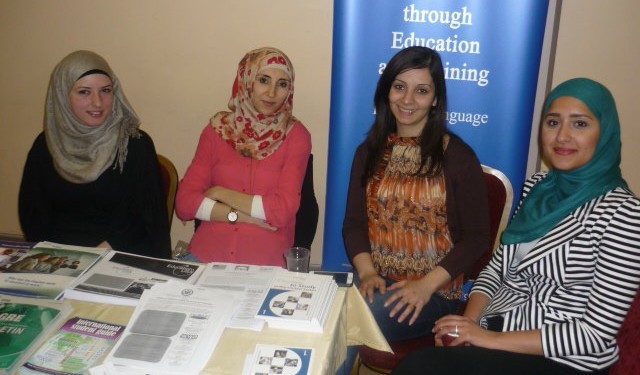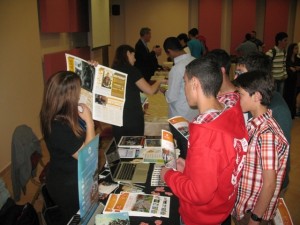AMIDEAST is trying to remedy this by giving English lessons, training Palestinian teachers and providing a variety of scholarships. It has less control, however, over another problem: obtaining student visas. Sometimes Israel can refuse to let Palestinians leave the West Bank because of a security claim against them, or simply because the person’s address is listed in Gaza.
News and business analysis for Professionals in International Education
Have some pie!
Palestine: breaking down barriers to study abroad
 Palestinian students at the student fair organised by AMIDEAST and the US Consulate; 15 US schools attended.
Palestinian students at the student fair organised by AMIDEAST and the US Consulate; 15 US schools attended. “[This can mean] difficulties in reaching the US consulate in Jerusalem in order to attend a visa interview,” says Sari Bashi, executive-director of Gisha, an Israeli non-governmental organisation that advocates freedom of movement for Palestinians. “Israel ordinarily does not allow Palestinians to enter east Jerusalem, and so it can be difficult to even reach the interview to request the visa.”
Those who get visas can also have complaints. A former PhD student and lecturer at the University of Texas, Inshirah Nabhan, told The PIE that while in the US, she needed to come home every six months to renew her visa. “Most of the international students at my university got far longer visas,” she says. “It cost me a lot in flights.”
“Most of the international students at my university got far longer visas”
Many also fail to win visas as they are unable to secure the “maintenance funds” required. This highlights the most fundamental obstacle facing those who study abroad: finance. With the cost of foreign study beyond most Palestinian families (in the US it averages around $40,000 a year), most Palestinians depend on scholarships such as Fulbright (USA) and Chevening (UK).
One awardee, who will travel to the US this August, told the PIE he felt the US was funding more Palestinians than ever but that competition for grants was fierce. “For the Fulbright, 50 apply and they take nine. But I encourage everyone to try, because even if you don’t get it, the process makes you stronger, and maybe you’ll get it next year.”
Political issues also have impact. Paying for her degree herself, Nabhan ran into trouble when Hamas came to power in the West Bank in 2006. Most foreign aid was slashed and her civil servant parents found their salaries cut. “Even though I was teaching, I still struggled to make ends meet,” she says.
 Awareness of scholarship opportunities has also been an issue, but thanks to promotion by NGOs this is improving. Social media also helps: the US Department of State is now said to publicise every exchange initiative it’s involved in on Facebook, reaching far more students.
Awareness of scholarship opportunities has also been an issue, but thanks to promotion by NGOs this is improving. Social media also helps: the US Department of State is now said to publicise every exchange initiative it’s involved in on Facebook, reaching far more students.
More importantly, foreign institutions are getting over their security concerns and starting to visit. Most want more diverse campuses, yet the majority of schools at the fair had never recruited Palestinians before.
“There are talented, passionate people here who have uniquely Palestinian stories to tell”
“There would be some real pros to Palestinian students coming to Columbia, which is in the Midwest,” Keila Ferree, coordinator of international admissions at Columbia College, Missouri, says. “We don’t have any Palestinian students and if we can recruit a few they would really be ambassadors for their countries and promote good dialogue with our American and other international students.”
Jack Newman, director of outreach and development for the New York Film Academy, said he was hoping to find new talent. “Now cameras that used to cost $25,000 cost $2,500-$5,000, and this has levelled the playing field in many ways. There are talented, passionate people here who have uniquely Palestinian stories to tell, and we’re here to provide them the opportunity to come to the US, learn how to do it properly and get their films produced.”
Increasing these opportunities won’t be easy. Some schools simply don’t have enough scholarships to support those interested. Others say they expect to spend at least three to five years marketing before they recruit any Palestinians.
However, for Keller the shift of attitudes is in itself promising. “It’s great that there is an increasing number of interested universities testing the waters—deciding that maybe it’s worth it to see for themselves what it’s like here, talking to Palestinians directly and not being scared off.”
Still looking? Find by category:



Some of you might have heard about Dr Izzeldin Abuelaish story, known now as “the Gaza doctor”. Following the tragic death of 3 of his daugthers and one niece in a bombardment back in 2009, Dr Abuelaish never sank into hatred, on the contrary he relentlessly calls for a dialogue between Palestinians and Israelis. His book “I shall not hate” is a fantastic lesson against hatred and revenge. He set up a fund called “Daughters for Life” to help sponsoring Palestinian girls and women for their studies abroad in order as a way forward in the Middle East. One can donate. Read more on http://daughtersforlife.com. (Credit to ILAC who had invited Dr Abuelaish during a pre ICEF fam trip in Toronto at which I participated).
I am thrilled about the efforts being made to recruit more international students to learn and collaborate with students in the US. Diversity in thought and perspective comes when there are real efforts made at understanding and appreciating those from backgrounds different than our own. The unfortunate part is there are many obstacles which discourage students of Palestinian descent from pursuing education in the US, mainly financial challenges and education about opportunities in the US. In addition prejudices about race and culture may discourage the effort to bring more Palestinians to the US to study. However, this article inspires hope as efforts are being made. The wheels may turn slowly, but at least they are turning.